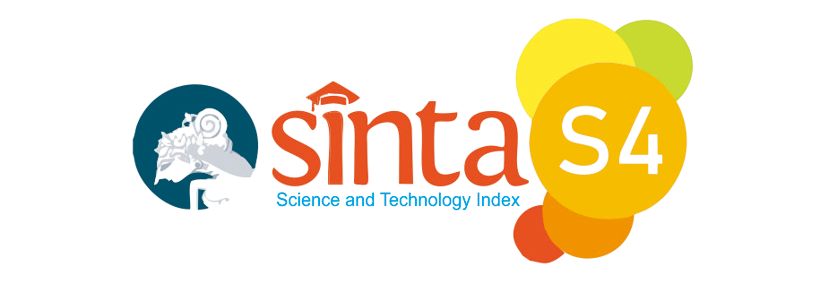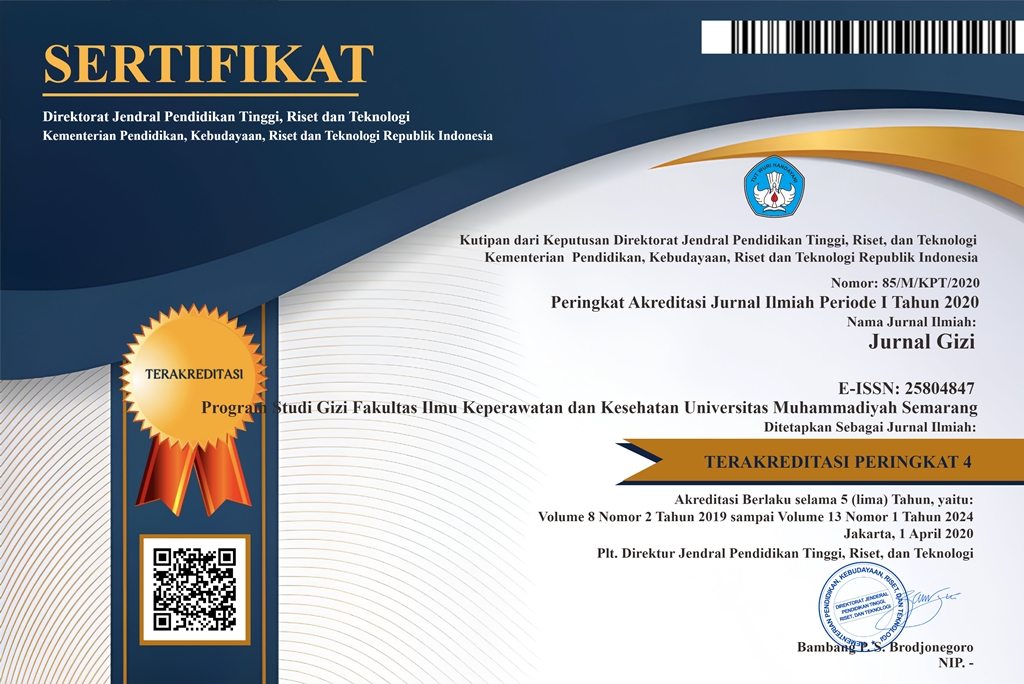Implementasi Konsep Health Belief Model terhadap Asupan Antioksidan Mahasiswa Gizi selama Pandemi COVID-19
(1) Program Studi S1 Gizi, Universitas Nahdlatul Ulama, Surabaya, Indonesia
(2) Program Studi S1 Gizi, Universitas Nahdlatul Ulama, Surabaya, Indonesia
(*) Corresponding Author
Abstract
Many recommendations were made by the Indonesia’s government to prevent the occurrence of COVID-19 infection. One of those recommendations is to make several behavioural changes, such as
increasing the consumption of foods containing vitamin A, C, E, and zinc to increase immunity system in the body. These eating pattern can be influenced by several factors, such as individual perceptions. The
purpose of this study was to determine the relationship between the concept of the health belief model and the eating pattern of Nutrition Students of UNUSA during the COVID-19 pandemic. Method of this study was analytic observational study with cross sectional design. The instruments used in this study were online questionnaire regarding the health belief model and semi-quantitative food frequency questionnaire (SQFFQ). All respondents had a high perception of the seriousness of the COVID-19 disease, benefits in increasing consumption of healthy foods, support for eating healthy foods, and self efficacy to adopt healthy eating pattern. 47.8% of respondents had a low perception of barriers to healthy behavior, while 65.5% of respondents had a high perception of susceptibility to COVID-19 infection. Most of the respondents had adequate daily intake of vitamin A (93.8%) and vitamin C (74.3%). There was a difference in vitamin C
intake between the group with high perceived barrier and the low perceived barrier group (p value 0.037). There was significantly negative relationship between perceived barrier and vitamin E intake in the subjects, which means that if a person has higher barriers to consuming vitamin E, the person's vitamin E intake will also be lower.
Keywords : COVID-19, health belief model, antioxidant, eating pattern
increasing the consumption of foods containing vitamin A, C, E, and zinc to increase immunity system in the body. These eating pattern can be influenced by several factors, such as individual perceptions. The
purpose of this study was to determine the relationship between the concept of the health belief model and the eating pattern of Nutrition Students of UNUSA during the COVID-19 pandemic. Method of this study was analytic observational study with cross sectional design. The instruments used in this study were online questionnaire regarding the health belief model and semi-quantitative food frequency questionnaire (SQFFQ). All respondents had a high perception of the seriousness of the COVID-19 disease, benefits in increasing consumption of healthy foods, support for eating healthy foods, and self efficacy to adopt healthy eating pattern. 47.8% of respondents had a low perception of barriers to healthy behavior, while 65.5% of respondents had a high perception of susceptibility to COVID-19 infection. Most of the respondents had adequate daily intake of vitamin A (93.8%) and vitamin C (74.3%). There was a difference in vitamin C
intake between the group with high perceived barrier and the low perceived barrier group (p value 0.037). There was significantly negative relationship between perceived barrier and vitamin E intake in the subjects, which means that if a person has higher barriers to consuming vitamin E, the person's vitamin E intake will also be lower.
Keywords : COVID-19, health belief model, antioxidant, eating pattern
Full Text:
PDFArticle Metrics
Abstract view : 2012 timesPDF - 310 times
DOI: https://doi.org/10.26714/jg.10.1.2021.14-22
Refbacks
- There are currently no refbacks.

This work is licensed under a Creative Commons Attribution 4.0 International License.
Diterbitkan oleh: Program Studi Gizi (D3 dan S1)
Fakultas Ilmu Keperawatan dan Kesehatan
Universitas Muhammadiyah Semarang
Sekretariat: Jl. Kedungmundu Raya No. 18 Semarang
Contact Person : Hapsari Sulistya Kusuma, S.Gz, M.Si (+62 85 6 41 536 553)

This work is licensed under a Creative Commons Attribution 4.0 International License.









.png)
.png)